Some canines truly exemplify the meaning behind the expression that states, dogs are humans’ best friends.
And, that someone is Moose!
This amazing German Shepherd dazzled the world with the single most unique act of selflessness, showing how thoughtful he is of his little hooman brother.
Even though Moose is not a trained therapy canine, he’s a real example of how intuitive and truly brilliant dogs can be. Here’s why!
A Lifelong Bond
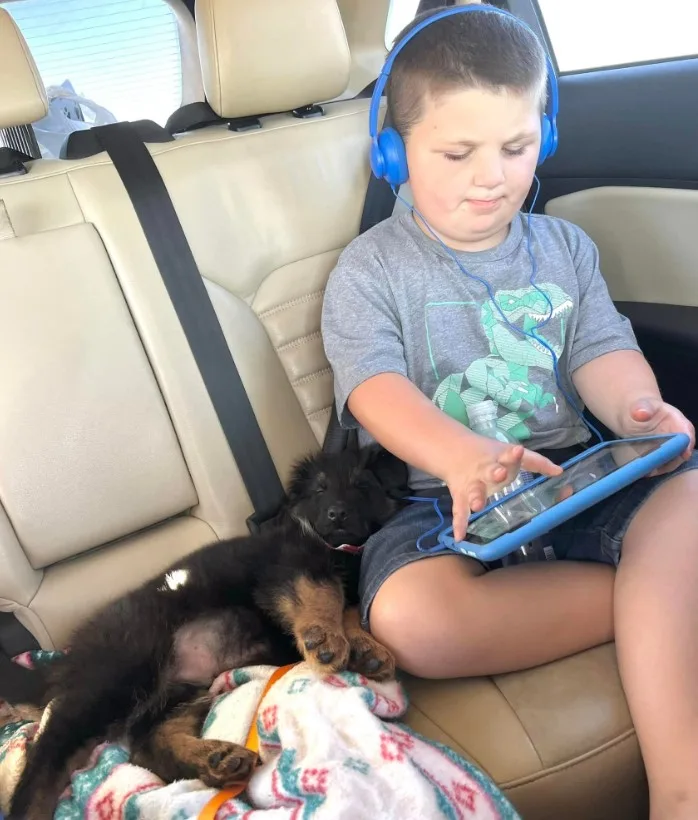
The Carpio family, from Oklahoma, brought Moose home as a puppy from Texas in 2022. When he arrived at the new home, never in their wildest dreams did they think Moose would be such an important part of their family.
They already had a dog named Chomper, also a German Shepherd, and having another dog wasn’t an option.
But, when Lauren saw a post about Moose looking for a family in a Facebook group, she just couldn’t say no. It was near her birthday, and Moose felt like the perfect present. So, it happened!
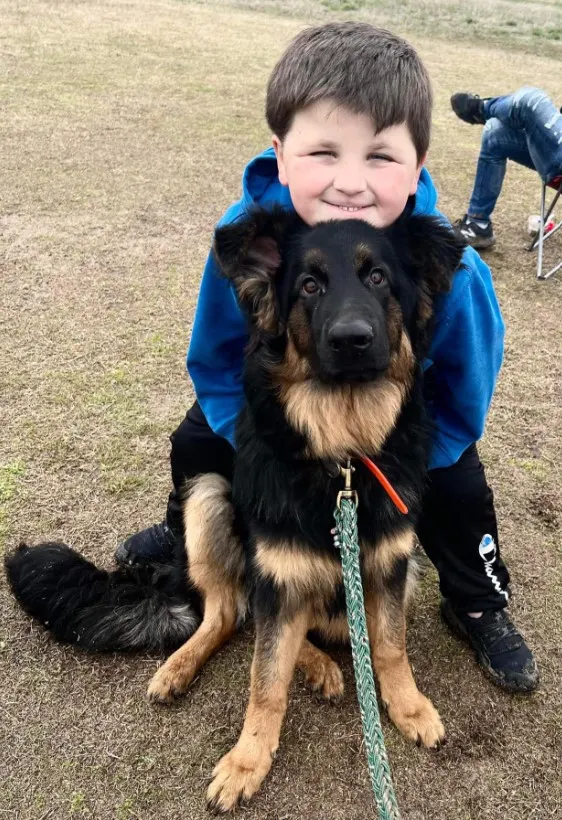
The entire family welcomed Moose with an open heart. Chomper was really happy to have a sibling, too, and so were the kids! But, before anyone else, Moose felt instantly drawn to his little brother, Noah.
Even though Moose was never subjected to any professional dog training, he knew right off the bat that his little hooman needed extra protection. Noah, the seven-year-old boy, has inborn heart issues that require multiple surgeries, and he also developed seizures.
His parents, Lauren and Josh, installed a camera in his room to have a live feed in case Noah has a seizure, but they didn’t know that there was an extra pair of eyes watching over their son.
Moose – The Family’s Protector
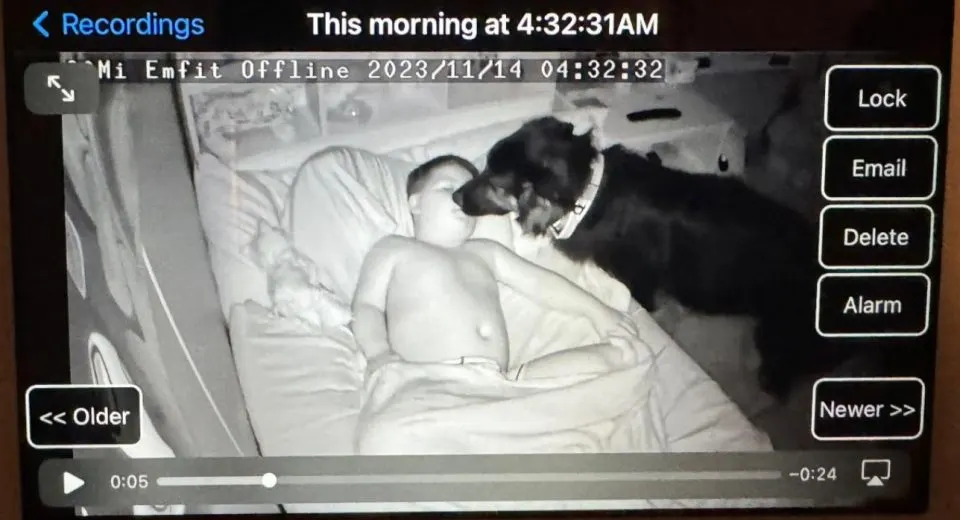
One night, Lauren looked at the camera to check on Noah when she saw the sweetest thing! There was Moose sneaking into Noah’s room and already checking on him.
He slowly approached Noah’s bed, looked at his little hooman buddy, and then gave him the sweetest kiss on the face. For the rest of the night, Moose slept right next to Noah’s bed, making sure to be there in case his brother needed him.
From that moment on, Moose sneaking into Noah’s room overnight became a regular thing.
“Moose goes in to check on him often and give him kisses. Sometimes I’m lucky and look at the camera at the perfect time and capture this adorableness,” wrote Lauren.
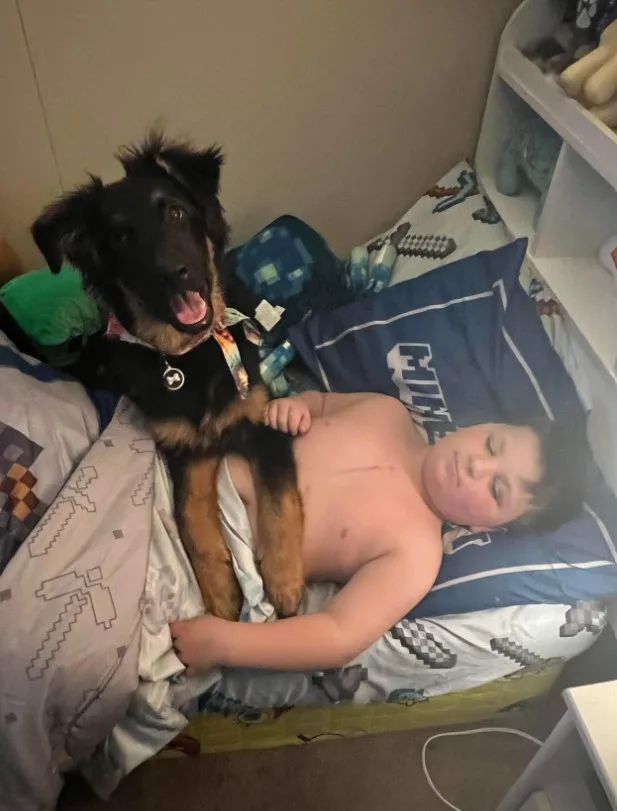
He doesn’t just check on Noah while he’s sleeping. This giant-hearted German Shepherd boi is on alert 24/7, and he always makes sure to be near Noah.
When his little hooman doesn’t feel well, he becomes more observant and refuses to leave his side. He checks on him repeatedly and licks him on the face every few minutes just to send a signal that he’s there for him.
Lauren and the family are truly grateful for having Moose in their family.
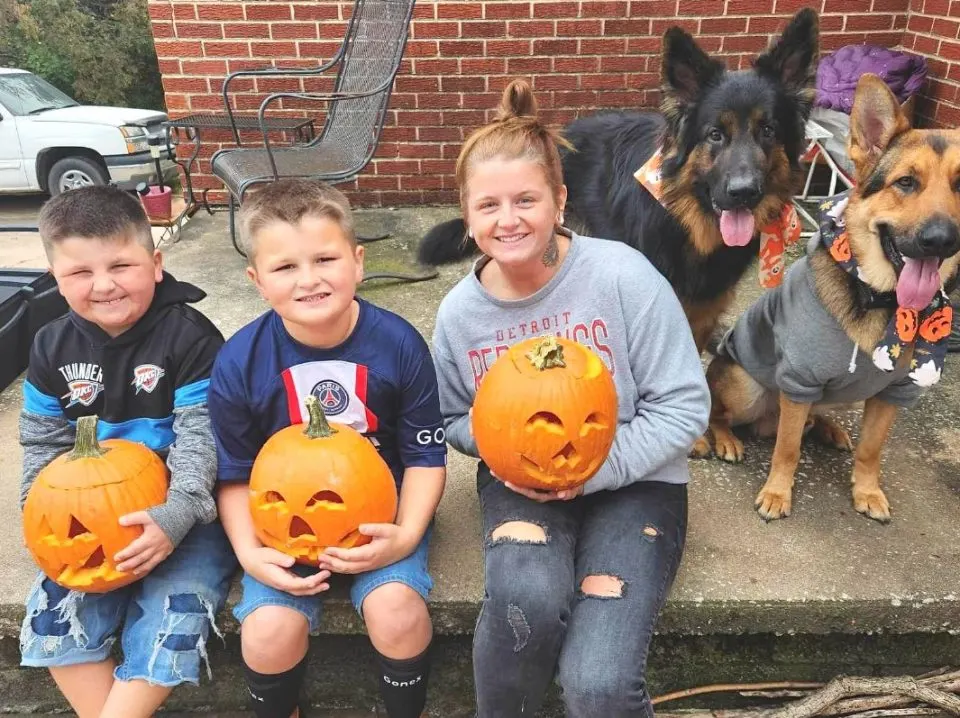
“He may not be trained to be a therapy/service dog, but you can’t look at these pictures and tell me he doesn’t have a special connection with my son. He brings so much joy and laughs to our lives every single day,” Lauren wrote for Dogspotting Society.
Even though he’s sometimes goofy and set in his own ways, the fact that he acts like Noah’s personal protector means the world to them.
He’s truly a special dog, and a true example of how truly beautiful the hooman-dog relationship can be!
If you’ve ever found yourself wondering why your furry friend just won’t stop whining, you’re not alone. Dog whining can be a perplexing behavior for many pet owners. It’s like trying to decode a secret language that only your dog seems to understand. Understanding the reasons behind this vocalization can be the key to a happier and more harmonious relationship with your canine companion.
Dogs communicate through various sounds, and whining is one of their ways to express themselves. From seeking attention to indicating discomfort, there are several reasons why your dog may be whining. As a dog owner, deciphering these cues can help you address your pup’s needs more effectively. So, the next time you hear those plaintive whimpers, remember that your dog is trying to tell you something important.
Understanding Canine Communication
The Language of Whining in Dogs
Dogs whine as a form of communication. It’s a way for them to express their needs or feelings. Understanding why your dog is whining is key to addressing their issues effectively.
Interpreting the Whines: What Your Dog May Be Trying to Tell You
When your dog whines, it could be seeking attention, indicating discomfort, or expressing anxiety. Pay attention to the context and accompanying body language to decode what your furry friend is trying to convey.
Common Reasons for Dog Whining
Seeking Attention or Affection
When your dog keeps whining, it may simply be seeking attention or affection from you. Dogs are social animals and love to be around their human companions. If they feel lonely or ignored, they might resort to whining to get you to interact with them. Spending quality time with your pup and giving them the attention they crave can help alleviate this behavior.
Expressing Anxiety or Fear
Whining can also be a sign that your dog is feeling anxious or scared. Dogs may whine when they encounter something that makes them uncomfortable or nervous. It’s essential to create a safe and secure environment for your furry friend to help reduce their anxiety. Comforting them during stressful situations and providing reassurance can assist in calming their fears.
Indicating Pain or Discomfort
Sometimes, whining can indicate that your dog is in pain or experiencing discomfort. Dogs may whine when they are unwell or in physical distress. It’s crucial to monitor your dog’s behavior closely and consult a veterinarian if you suspect they are in pain. Addressing any underlying health issues promptly is vital for your pet’s well-being.
Requesting Food or Water
If your dog is whining persistently, it might be their way of letting you know they are hungry or thirsty. Dogs have basic needs like food and water, and whining could be their way of communicating this to you. Ensuring that your dog is fed regularly and has access to fresh water can prevent excessive whining due to hunger or thirst.
Wanting to Go Outside
When your dog whines at the door or paces around restlessly, it could be a sign that they need to go outside. Dogs have a natural instinct to relieve themselves outdoors, and whining may be their way of signaling their need to go potty. Taking your dog for regular walks and providing opportunities for outdoor bathroom breaks can help curb whining associated with the desire to go outside.
Behavioral and Environmental Factors
Lack of Exercise and Boredom
If your dog keeps whining, it could be due to a lack of exercise and boredom. Just like humans, dogs need physical activity to stay healthy and happy. When dogs don’t get enough exercise, they can become restless and may express their frustration through whining. Ensuring your furry friend gets regular exercise can help alleviate this behavior.
Poor Socialization or Past Trauma
Another reason for your dog’s constant whining could be poor socialization or past trauma. Dogs that haven’t been properly socialized or have experienced trauma in the past may exhibit anxious behaviors like whining. It’s essential to create a safe and comfortable environment for your dog, helping them overcome any past negative experiences that may be causing distress.
Changes in the Home Environment
Changes in the home environment can also trigger whining in dogs. Dogs are creatures of habit, and sudden changes in their surroundings, such as moving to a new house, introducing new family members, or even rearranging furniture can cause stress and lead to whining. Providing a stable environment and gradually introducing changes can help reduce anxiety-related whining in your furry companion.
Health-Related Causes of Whining
Signs of Illness or Injury
If your dog is whining persistently, it could indicate underlying health issues. Watch out for signs like changes in eating habits, lethargy, vomiting, diarrhea, or limping. These could be red flags that your furry friend is in pain or discomfort. It’s essential to consult a veterinarian to rule out any medical conditions causing the whining.
Age-Related Issues in Senior Dogs
As dogs age, they may experience age-related challenges leading to whining. Senior dogs could suffer from arthritis, cognitive dysfunction, or sensory loss, causing them to vocalize more frequently. If your older dog is whining more than usual, it could be due to these age-related issues. Ensuring proper veterinary care, a comfortable environment, and adjusting their routine to accommodate their needs can help alleviate their distress.
Solutions and Strategies to Reduce Whining
Establishing Routine and Training
To curb your dog’s whining, it’s crucial to establish a consistent daily routine. Dogs thrive on predictability, so feeding, exercise, playtime, and rest should occur at the same times each day. By setting a routine, you provide structure that can alleviate anxiety and reduce the need for attention-seeking whining. Training your dog with positive reinforcement techniques can also help. Teaching commands like “quiet” and rewarding calm behavior can encourage your dog to communicate without whining.
Providing Physical and Mental Stimulation
A tired and stimulated dog is less likely to whine out of boredom or excess energy. Ensure your furry friend gets enough physical exercise through daily walks, runs, or play sessions. Mental stimulation is equally important. Puzzle toys, interactive games, and training exercises engage your dog’s mind and prevent restlessness that may lead to whining. By keeping your dog both physically and mentally active, you can reduce whining behavior significantly.
Approaching Professional Help
If your dog’s whining persists despite your efforts, seeking professional help from a certified dog trainer or animal behaviorist is recommended. These experts can assess your dog’s behavior, identify underlying issues, and provide personalized strategies to address the whining effectively. Additionally, consultation with a veterinarian is essential to rule out any medical causes of whining. A thorough evaluation by a vet can help determine if pain, discomfort, or illness is contributing to your dog’s vocalizations.
Conclusion
Understanding why your dog keeps whining is crucial for addressing their needs effectively. Whether it’s seeking attention, anxiety, pain, hunger, or simply the need to go outside, each reason requires a tailored approach. Factors like lack of exercise, boredom, poor socialization, trauma, or changes in the home environment can also contribute to this behavior. Health-related issues, especially in senior dogs, should not be overlooked. By monitoring signs of illness or injury and providing proper care, you can help alleviate their distress. Implementing solutions such as establishing a routine, positive reinforcement training, and seeking professional help when needed can make a significant difference in reducing your dog’s whining. Remember, each dog is unique, so patience and consistency are key in finding the right solution for your furry friend.
Frequently Asked Questions
Why is my dog whining?
Dogs may whine for attention, due to anxiety, hunger, pain, or the need to go outside. Factors like lack of exercise, boredom, poor socialization, trauma, or changes in the home environment can also contribute to whining behavior.
How can I address my dog’s whining?
Understand the underlying reasons for your dog’s whining behavior and address their needs accordingly. Establish a routine, provide training with positive reinforcement, offer physical and mental stimulation, and seek professional help if needed.
What health issues could be causing my dog to whine?
Health-related causes of whining may include signs of illness or injury, especially in senior dogs facing age-related challenges like arthritis or cognitive dysfunction. Monitor your dog for any signs of distress and consult a veterinarian if necessary.
[no_toc]

Hey there, I’m Janet Brooks, a dog-loving student from California. I’m all about helping pups in need, especially those without homes. Me and my awesome friends work together to give shelter and love to stray dogs. Oh, and I also write blogs about dogs to share helpful info.